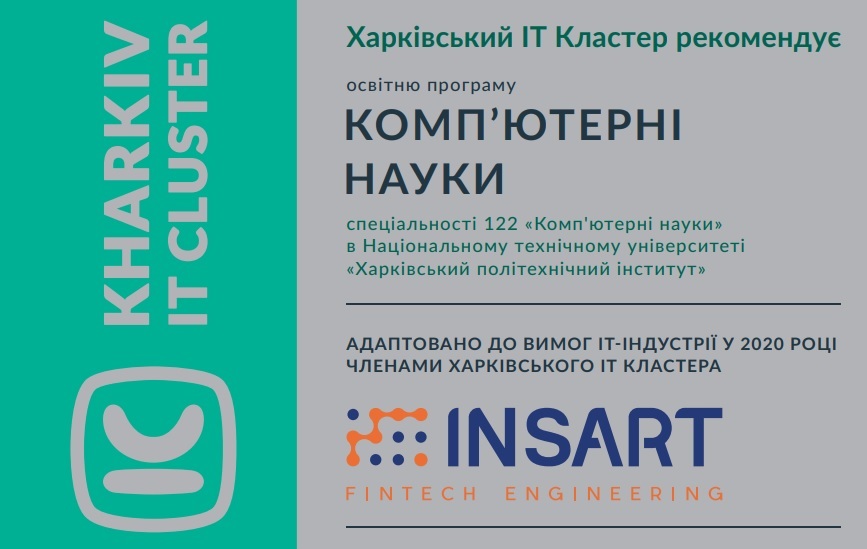Educational Program
Computer Science
Graduating departments
System Analysis and Information-Analytical technologies
Brief description
Educational program “Computer Science” – aimed at preparing bachelors who have a thorough mathematical training and knowledge in the field of programming, have algorithmic thinking. Know modern methods of construction and analysis of efficient algorithms and the ability to implement them in specific applications. Know the standards, methods and tools for managing the life cycle of information systems, IT products and services. Have knowledge of theoretical foundations, processes and procedures of IT project management, principles of teamwork.
Employment opportunities
Our graduates work in the following companies: Nix Solutions, GlobalLogic, Epam, Sigma Sofware, Telenor, OSCE Luxoft, Ronis Business Tools, TrendLine, Vaimo, Bridgewater Associates, Promodo, Pipe-X and many others. They hold the positions of Project Manager, Business Analyst, Software Engineer, QA Engineer, Business Development Manager and others. LineUp is also headed by our graduate.
Selective educational components (Profile blocks). Brief description
1. Information Technology Project Management
A feature of the disciplines of the unit is intended for those who want to master the technology of creating information processing systems and manage their development and implementation. In the process of studying under the bachelor’s program, students master the necessary mathematical disciplines, programming languages C ++, C #, JAVA, PHP, Java Script, Python, master the basics of IT project management. The program is based on the requirements of IEEE, IPMA, PMI, ISO / IEC 12207, taking into account the experience of the best universities in the world. Close ties have been established with the Community of IT Directors of Ukraine and enterprises in the industry. Training in project management methods and tools is combined with a large amount of practical work aimed at managing real projects.
2. Information and analytical systems and technologies
A feature of the disciplines of the block “Information and analytical systems and technologies” is their focus on deepening the applied mathematical training of future bachelors, which focuses on developing information and analytical systems to support decision making in business process management , training in computer graphics and multimedia, development of modern information systems and web applications. Skills in software development are supported by the study of modern methods of testing. Disciplines of the last semester are focused on the application of previously acquired knowledge in the development of software systems focused on the use of information technology. In general, students receive a degree that allows them to either go directly to practical activities in any field of information technology, or continue their studies in graduate school.
3. Data and Knowledge Engineering
The focus of specialization training is cloud information consolidation software. Architectural solutions of such services are planned, designed, modeled and implemented using methods, technologies and tools of Web-programming, data engineering and knowledge to solve problems and meet “digital” information needs of a particular clientele or social group, which are otherwise unable to effectively and efficiently Consolidate consolidated information and knowledge gained because it is difficult to access in its original form and is usually obtained from many distributed sources of information.
4. Intellectual Property in Computer and Software Engineering
The object of specialization is the objects of intellectual property rights, including software, digital multimedia content, inventions and utility models for software, systems and circuit solutions, industrial designs , trade secrets and know-how, marks for goods and services, computer programs, databases, websites, brand names and domain names, topologies of integrated circuits and other “digital” intellectual property objects that identify property rights on the means of digital environment to consolidate information in the data life cycle and its content.
5. Artificial Intelligence and Machine Learning
The object of specialization training is software that reproduces neuromorphic (similar to natural) architectures of artificial intelligence, high-performance parallel algorithms that model the behavior of the human brain to process unstructured information and sensory perception environment (virtual and augmented reality), cognitive technologies that combine artificial intelligence and machine learning algorithms, computer models of human behavior, designed not so much for accuracy as for accuracy to solve large-scale computational problems of fuzzy logic, big data, soft calculations, etc.
